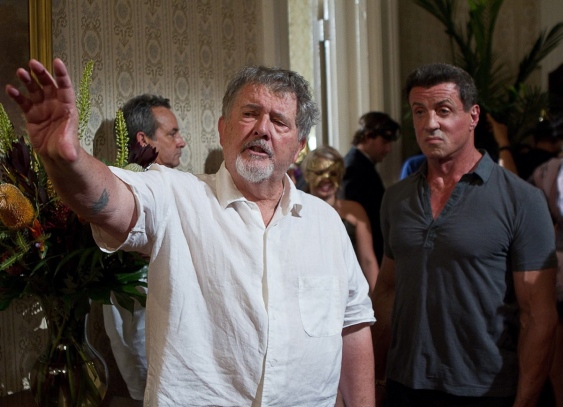
An exclusive CityArts critics discussion of Walter Hill’s comeback
By Armond White
Bullet to the Head is an event. It is director Walter Hill’s first theatrical film since 2002’s Undisputed and the most meaningful Sylvester Stallone acting vehicle since Rocky. On this occasion I discuss the significance of Bullet to the Head with CityArts film critic Gregory Solman, author of the definitive essay on Hill’s oeuvre, as a good movie, an essay on masculinity and an advance in contemporary cinema aesthetics.
AW: Stallone’s performance as career hitman Jimmy Bobo reminded me of Charles Bronson’s streetfighter in Hill’s directorial debut Hard Times. The same grizzled features, the same masculine ethos. The plot of Bobo teaming up with policeman Taylor Kwan (Sung Kang) recalled Hill’s buddy movie 48 HRS. Hill and Stallone’s cinema histories are combined, the action genre is updated.
GS: It’s the ideal comparison, I agree, because Hill makes the essential emotional connections to character lesser directors ignore–directors, I might add, who are all worse at directing action than Hill, yet are no better than him with actors. I like reminding people that when Bronson’s performance stunned everyone in Hard Times, it was Bronson’s 60th movie–and Hill’s first. I won’t forget Bruce Willis in Last Man Standing, either. Stallone’s saturnine mood and weathered face are alone more interesting than his revivals of Rocky and Rambo combined, because Hill understands the power of genre and, more than anyone else in contemporary filmmaking, takes to heart F. Scott Fitzgerald’s crystalline bromide: “Action is character.” Have new filmmakers learned from Hill in Exile, or from Neveldine/Taylor, for that matter?
AW: Hill in Exile is an interesting way to describe the past decade of inept action movies. From David Fincher to Steve Soderbergh and the Bourne movies, most filmmakers don’t know how to film action with meaning or action heroes with ethics. Hill has been sorely missed. Remember the pop culture fun of Streets of Fire which updated pop nostalgia and genre refinement?
GS: It was cinematic celebration from start to finish, and gets at Hill’s great advance in comic-book form. The sledge-hammer fight anticipates the fire-axe battle between Bobo and mercenary Keegan (Jason Momoa), but beneath that lies the inevitability of one-on-one confrontation between, in this story, the two breeds of ex-military mercenary, Bobo and Keegan, who has an embittered idealism defined by codes of manhood.
AW: This movie has the best dialogue in years. Stallone hasn’t worked with a such a good director since Norman Jewison on F.I.S.T. and here gives his best performance. Hill knows how make a few words matter. He evokes personal ethics and sums up genre ethics.
GS: He brought back his signature single-exchange scenes, too, which I love. I’m not a fan of Bobo’s final, or rather, penultimate riposte [“That’ll be the day”], though I like the recapitulation of Jack Cates-the-cop in 48 Hours in Kwon’s challenge, and imagine Bobo to be a fan of John Wayne in general, Ethan Edwards in particular. To be clear, it’s not the line itself, or the association, but it strikes me as an over-articulation.
AW: I disagree. The Searchers is a famous cinema touchstone. I love that Hill rescued Wayne’s line from a pedestal.
The Walter Hill dialogue continues at www.CityArts.info
